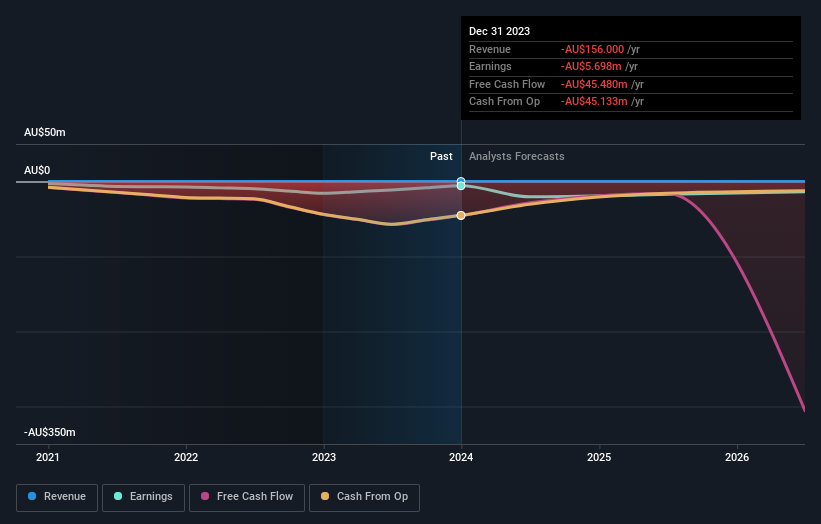Retail investors account for 38% of Predictive Discovery Limited's (ASX:PDI) ownership, while institutions account for 36%
Key Insights
Predictive Discovery's significant retail investors ownership suggests that the key decisions are influenced by shareholders from the larger public
The top 10 shareholders own 50% of the company
To get a sense of who is truly in control of Predictive Discovery Limited (ASX:PDI), it is important to understand the ownership structure of the business. The group holding the most number of shares in the company, around 38% to be precise, is retail investors. Put another way, the group faces the maximum upside potential (or downside risk).
Meanwhile, institutions make up 36% of the company’s shareholders. Large companies usually have institutions as shareholders, and we usually see insiders owning shares in smaller companies.
Let's take a closer look to see what the different types of shareholders can tell us about Predictive Discovery.
Check out our latest analysis for Predictive Discovery
What Does The Institutional Ownership Tell Us About Predictive Discovery?
Many institutions measure their performance against an index that approximates the local market. So they usually pay more attention to companies that are included in major indices.
Predictive Discovery already has institutions on the share registry. Indeed, they own a respectable stake in the company. This implies the analysts working for those institutions have looked at the stock and they like it. But just like anyone else, they could be wrong. It is not uncommon to see a big share price drop if two large institutional investors try to sell out of a stock at the same time. So it is worth checking the past earnings trajectory of Predictive Discovery, (below). Of course, keep in mind that there are other factors to consider, too.
Hedge funds don't have many shares in Predictive Discovery. Our data shows that BlackRock, Inc. is the largest shareholder with 14% of shares outstanding. Capital DI Limited is the second largest shareholder owning 9.6% of common stock, and Franklin Resources, Inc. holds about 4.9% of the company stock.
We also observed that the top 10 shareholders account for more than half of the share register, with a few smaller shareholders to balance the interests of the larger ones to a certain extent.
While it makes sense to study institutional ownership data for a company, it also makes sense to study analyst sentiments to know which way the wind is blowing. Quite a few analysts cover the stock, so you could look into forecast growth quite easily.
Insider Ownership Of Predictive Discovery
While the precise definition of an insider can be subjective, almost everyone considers board members to be insiders. Management ultimately answers to the board. However, it is not uncommon for managers to be executive board members, especially if they are a founder or the CEO.
Most consider insider ownership a positive because it can indicate the board is well aligned with other shareholders. However, on some occasions too much power is concentrated within this group.
Our information suggests that insiders maintain a significant holding in Predictive Discovery Limited. It has a market capitalization of just AU$488m, and insiders have AU$68m worth of shares in their own names. It is great to see insiders so invested in the business. It might be worth checking if those insiders have been buying recently.
General Public Ownership
With a 38% ownership, the general public, mostly comprising of individual investors, have some degree of sway over Predictive Discovery. While this size of ownership may not be enough to sway a policy decision in their favour, they can still make a collective impact on company policies.
Private Company Ownership
Our data indicates that Private Companies hold 12%, of the company's shares. It's hard to draw any conclusions from this fact alone, so its worth looking into who owns those private companies. Sometimes insiders or other related parties have an interest in shares in a public company through a separate private company.
Next Steps:
It's always worth thinking about the different groups who own shares in a company. But to understand Predictive Discovery better, we need to consider many other factors. For example, we've discovered 5 warning signs for Predictive Discovery (3 can't be ignored!) that you should be aware of before investing here.
Ultimately the future is most important. You can access this free report on analyst forecasts for the company.
NB: Figures in this article are calculated using data from the last twelve months, which refer to the 12-month period ending on the last date of the month the financial statement is dated. This may not be consistent with full year annual report figures.
Have feedback on this article? Concerned about the content? Get in touch with us directly. Alternatively, email editorial-team (at) simplywallst.com.
This article by Simply Wall St is general in nature. We provide commentary based on historical data and analyst forecasts only using an unbiased methodology and our articles are not intended to be financial advice. It does not constitute a recommendation to buy or sell any stock, and does not take account of your objectives, or your financial situation. We aim to bring you long-term focused analysis driven by fundamental data. Note that our analysis may not factor in the latest price-sensitive company announcements or qualitative material. Simply Wall St has no position in any stocks mentioned.


